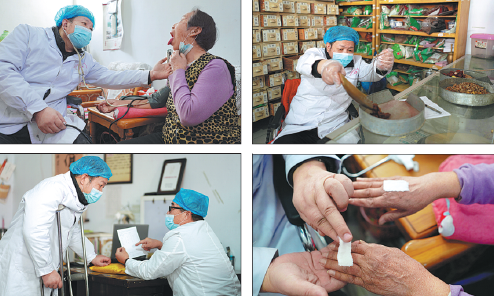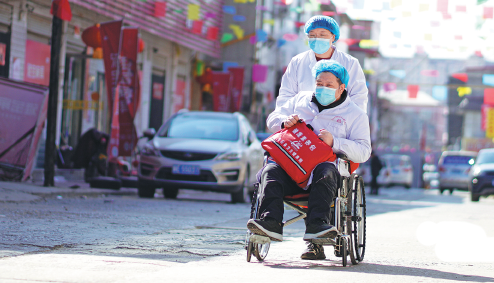Village doctor inspires and heals
Dedication to safeguarding health in rural China wins applause

Jiao Junying, 46, is a clinic doctor in Nanjie village, Neiqiu town, Xingtai, in North China's Hebei province. He has been awarded many honorary titles in the province. When he was young, Jiao got polio which resulted in the loss of lower-limb movement. This spurred him on to achieve his childhood dream to become a doctor and bring health to more people.
Since 2015, Jiao has become the contracted family doctor for the villagers in Nanjie, and has become the "health steward". From measuring blood pressure, writing prescriptions, and popularizing knowledge about health and well-being, Jiao's daily schedule is packed. He regularly conducts physical examinations for the village elderly and does follow-up visits for chronic diseases, and maintains health records for the villagers. In addition, Jiao studies traditional Chinese medicine and constantly enriches his knowledge.
"The recognition by the villagers is a great trust and encouragement for me. As long as the villagers still need me, I am willing to always protect their health." Jiao says.
He can't remember how many home visits he has made in the past six years and how many patients he has treated, but every patient he treats remembers him.
With a good heart, he is the health goalkeeper closest to the common people. Jiao says that by escaping death, he understands the preciousness of life and is more willing to protect the health of others.
In Jiao's view, from poverty alleviation to rural revitalization, China's policies are getting better and better, and the medical conditions in rural areas are improving. He is willing to stick to the cause.
In the new medical reform, the construction of the basic medical and health system has been further promoted, and Jiao has another task-to establish health records for the villagers. Together with his colleagues, he has built up their health records. The files are in a box, on the computer, and in his heart. He knows exactly which old man was sick and which child should be vaccinated.
"A face covered in mud, without the halo of God; hold the ordinary in the hand tightly, this heart has no regrets in life." This is the lyric of the song "As Long as the Ordinary", and Jiao, in an ordinary position, with a physical challenge, interprets the greatness of the village doctor with his own actions.
Rural doctors working on the frontline not only undertake 16 basic national public health services, but also patient medical treatment, epidemic prevention and control and many other tasks. Rural doctors are the link and bridge between the government and the health department to connect the people.
He says treating a patient is like fighting a war, and using medicine is like using a soldier. Their disease is his calling. It is his responsibility to treat the patient well. He never sells expensive medicines. It is also his intention and responsibility to minimize the cost for them. Encouragement is his driving force, and the people's wishes are his direction.
Doing one thing well is easy, but sticking to it for a long time is not easy at all. Jiao has established his roots in the countryside, and for the past years, he went back and forth between the clinic and the villagers' homes, treating illness and saving people. He served the villagers with his superb medical skills, became the guardian of the villagers' health, and interpreted the original intention of serving the people with persistence and perseverance.
In a civilized society, people with physical challenges are often considered a vulnerable group. Jiao has taught everyone he met a vivid life lesson; they can be stronger and can do better than ablebodied people.



Today's Top News
- Berlin and Beijing: Charting a course for stability and green growth
- China sees record daily passenger flow in Spring Festival travel rush
- China issues import tax incentives for sci-tech popularization
- Trump raises new global tariff from 10% to 15%
- Researchers conclude Antarctic sea survey
- Trump signs order for a global 10-percent tariff






























